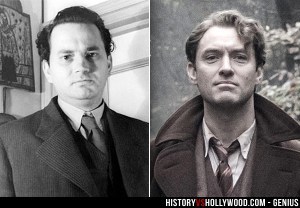The Idiocies of Genius
Recently I watched Genius, the 2016 film about the relationship between Southern novelist Thomas Wolfe (Jude Law) and his editor, Maxwell Perkins (Colin Firth). There are also cameos by F. Scott Fitzgerald (Guy Pearce) and Ernest Hemingway (Dominic West). The moral of the story: genius comes in different packages, and sometimes it isn’t recognized until it’s too late. Or something.
I knew the name Maxwell Perkins, and of course had encountered Wolfe in my Southern Lit classes back in college. I was particularly surprised at how much of the film’s run time was concerned with the actual mechanics of getting a manuscript ready. But overall I was both underwhelmed by the movie, and curious about the real Perkins. So I picked up Max Perkins, Editor of Genius by A. Scott Berg, the source for the film.
And once again I ran into the great truth about movies: they are often made by people who, because they’ve spent their whole lives watching and doing nothing but movies, can only translate fascinating real life into the same tired tropes they’ve seen in other films. Genius leaves out virtually all the really interesting details about Wolfe’s relationship with Perkins, and replaces them with trite scenes you’ll find in virtually every biopic, regardless of topic.

The real Thomas Wolfe (l) and actor Jude Law portraying him. Note that the camera has to look up at the real Wolfe because of his extreme height.
To begin with, let’s talk casting. Whatever else he was, Thomas Wolfe was physically huge. At a time when average men were 5’8”, he was 6’6”. He dominated any room, and had difficulty with doors and vehicles being too small. Yet in the film, he’s portrayed by Jude Law, who is of average height and size. Worse, he’s cast opposite an actor (Firth) who’s actually taller (see the image in the poster above). So right away, one unique and fascinating aspect of his character—this enormous North Carolina hillbilly careening through pre-Depression New York City—is gone, replaced by a pretty British actor whose Southern accent is straight out of Steel Magnolias (not a compliment), and who performs with all the subtlety of Dennis Quaid playing Jerry Lee Lewis.
Colin Firth as Perkins is essentially fine, since the character is well within his range and his American accent is less specific than Wolfe’s. But again, fascinating details found in the book are left out. For example, Perkins had a custom-made standing work desk decades before such things were common, yet you won’t find it in the movie; he’s shown in a typical office, where he works like an accountant. And the list of famous authors he discovered began before Wolfe, and continued afterward; it’s only movie-think that implies that after Wolfe, Perkins essentially did nothing notable.
Worse are the moments invented for the movie that simply aren’t true. In one scene, Wolfe’s married lover (Nicole Kidman) pulls a gun on Perkins; this was mentioned as a veiled threat in a letter, but didn’t actually occur. Toward the end, Wolfe visits F. Scott Fitzgerald in Hollywood, where the scribe of the Jazz Age tells Wolfe that Perkins has “a genius for friendship,” thereby making the title ironic (italics mine, but thoroughly implied by the movie). This visit is never mentioned in the book, and functions merely as the final reckoning before the onslaught of the illness that killed Wolfe (and did not involve collapsing on a Hollywood beach).
Why does all this annoy me so much? I mean, no one looks to movies for actual history, right? It’s because in so many ways, this is typical of what happens to true stories in the movies: filmmakers assume that something they’ve seen in another movie is somehow better than the actual truth, which is often quirky and original and very, very cinematic. And these movies then become the history, at least in most people’s minds.
Still, even though (again) there’s no real documentary evidence to back it up, I have to praise the depiction of the actual editorial work involved in revising Look Homeward, Angel and Of Time and the River. Perkins never tells Wolfe what to write, he merely guides his thought process in a way that lets the author come up with the solution. When he advocates cuts (necessary since the movie is accurate about the Brobingdangian size of Wolfe’s original manuscripts), he explains why, and his reasons always have to do with story, not marketing concerns or the practicalities of printing. Wolfe, for his part, is shown resisting these suggestions at first, then finally coming around and providing revisions, often on the spot. This, in my experience, is very true to life, in a job that hasn’t substantially changed since then.
So overall, Genius infuriated me. It was about things that I know well: Southernness, book writing, and the editorial process. It only got the last of those things right.
You can find another, more detailed history-to-film comparison here.



